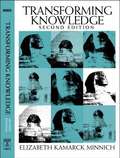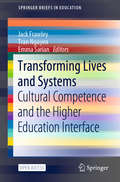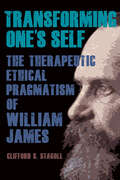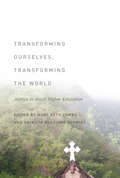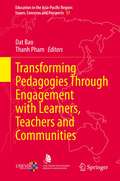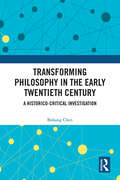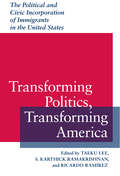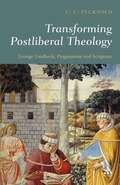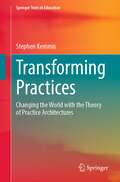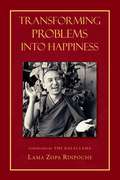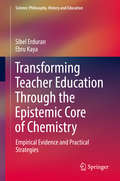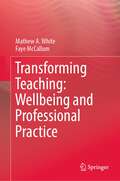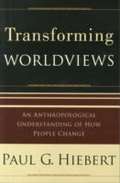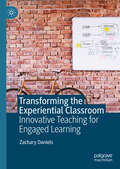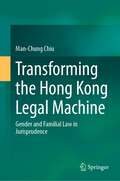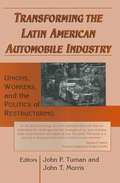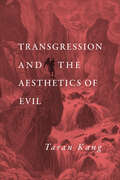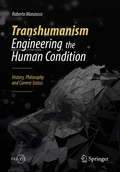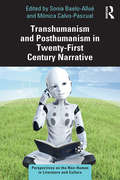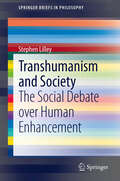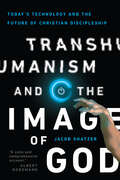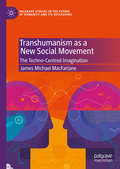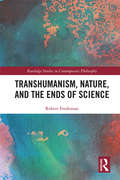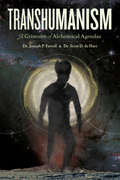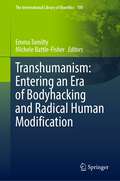- Table View
- List View
Transforming Knowledge, Second Edition
by Minnich Elizabeth KamarckThis is a book about how we define knowledge and how we think about moral and political questions. It argues that the prevailing systems of knowledge, morality, and politics are rooted in views that are exclusionary and therefore legitimate injustice, patriarchy, and violence. That is, these views divide humans into different kinds along a hierarchy whose elite still defines the systems that shape our lives and misshape our thinking. Like the first edition of Transforming Knowledge, this substantially revised edition calls upon us to continue to liberate our minds and the systems we live within from concepts that rationalize inequality. It engages with the past fifteen years of feminist scholarship and developments in its allied fields (such as Cultural Studies, African American Studies, Queer Studies, and Disability Studies) to critique the deepest and most vicious of old prejudices. This new edition extends Minnich's arguments and connects them with the contemporary academy as well as recent instances of domination, genocide, and sexualized violence. * Updated to consider recent scholarship in Gender, Multicultural, Postcolonial, Disability, Native American, and Queer Studies, among other fields of study * Revised to include an extended analysis of the conceptual errors that legitimate domination, including the construction of kinds ("genders") of human beings * Revised to include new materials from a variety of cultures and times, and engages with today's contemporary debates about affirmative action, postmodernism, and religion
Transforming Lives and Systems: Cultural Competence and the Higher Education Interface (SpringerBriefs in Education)
by Jack Frawley Tran Nguyen Emma SarianThis open access book explores the transformative experiences of participants in the University of Sydney’s National Centre for Cultural Competence (NCCC) programs. The establishment of the NCCC was viewed as a critical point of departure for developing an institution-wide agenda of cultural competence. The NCCC’s work since its inception reflects efforts to lay important foundations for cultural change at the University. With the ultimate aim of establishing cultural competence as an agent for transformational change and social justice education, the NCCC has steadily expanded its research and teaching work both within and beyond the University of Sydney. Further, it has developed foundational resources to support and encourage University staff to integrate cultural competence philosophy and pedagogy in their curricula, teaching and research. This includes the ability to engage meaningfully with the cultures, histories and contemporary issues in Aboriginal and Torres Strait Islander communities. The NCCC programs have been designed to encourage participants to learn about who they are and how they can positively impact the transformational change the University has begun.The book presents participants’ reflections on their experiences at the organisational and personal level. Readers will gain insights into a range of topics including cultural competence, communities of practice, policy implementation, and transformative leadership at the interface between higher education and professional lives.
Transforming One's Self: The Therapeutic Ethical Pragmatism of William James (SUNY series in American Philosophy and Cultural Thought)
by Clifford S. StagollWilliam James (1842–1910) authored some of America's most original and evocative philosophy and psychology. Until recently, however, his work in ethics attracted little interest, despite suggestions from such distinguished peers as John Dewey that ethical themes suffused his writings. Taking those suggestions seriously, Clifford S. Stagoll provides an original and rigorous interpretation of James's ethics as a response to the socio-economic circumstances of his day, derived from key themes in his metaphysics, philosophical psychology, philosophy of religion, and pedagogical theory. By considering these apparently disparate projects together, Stagoll shows how James's recommendations for pursuing a richer, more rewarding life—an ethics in the classical sense—are justified by intricate and sophisticated analyses of how we think, act, and conceive of ourselves. For James, making a habit of experimenting with life's myriad opportunities is not just a way to counter thinking that has grown too rigid, but a crucial precondition for making the most of one's life and self.
Transforming Ourselves, Transforming the World: Justice in Jesuit Higher Education
by Mary Beth Combs Patricia Ruggiano SchmidtTransforming Ourselves, Transforming the World is an insightful collection that articulates how Jesuit colleges and universities create an educational community energized to transform the lives of its students, faculty, and administrators and to equip them to transform a broken world. The essays are rooted in Pedro Arrupe’s ideal of forming men and women for others and inspired by Peter-Hans Kolvenbach’s October 2000 address at Santa Clara in which he identified three areas where the promotion of justice may be manifested in our institutions: formation and learning, research and teaching, and our way of proceeding.Using the three areas laid out in Fr. Kolvenbach’s address as its organizing structure, this stimulating volume addresses the following challenges: How do we promote student life experiences and service? How does interdisciplinary collaborative research promote teaching and reflection? How do our institutions exemplify justice in their daily practices? Introductory pieces by internationally acclaimed authors such as Rev. Dean Brackley, S.J.; David J. O’Brien; Lisa Sowle Cahill; and Rev. Stephen A. Privett, S.J., pave the way for a range of smart and highly creative essays that illustrate and honor the scholarship, teaching, and service that have developed out of a commitment to the ideals of Jesuit higher education. The topics covered span disciplines and fields from the arts to engineering, from nursing to political science and law. The essays offer numerous examples of engaged pedagogy, which as Rev. Brackley points out fits squarely with Jesuit pedagogy: insertion programs, community-based learning, study abroad, internships, clinical placements, and other forms of interacting with the poor and with cultures other than our own. This book not only illustrates the dynamic growth of Jesuit education but critically identifies key challenges for educators, such as: How can we better address issues of race in our teaching and learning? Are we educating in nonviolence? How can we make the college or university “greener”? How can we evoke a desire for the faith that does justice?Transforming Ourselves, Transforming the World is an indispensable volume that has the potential to act as an academic facilitator for the promotion of justice within not only Jesuit schools but all schools of higher education.
Transforming Pedagogies Through Engagement with Learners, Teachers and Communities (Education in the Asia-Pacific Region: Issues, Concerns and Prospects #57)
by Dat Bao Thanh PhamThis book identifies three types of influential forces that pose challenges to innovations: socio-cultural dynamics, teacher individuality, and local circumstances. It uses languages, cultural traits, and intellectual heritages in the Asia-Pacific region as an example to show the resistance to Western-based pedagogies due to disparities between the innovations and these local heritages. It reveals personal and professional values that teachers hold and how these values, while seemingly supporting creative ideologies, happen to prevent them from incorporating innovations in their practices. The book discusses how informal educational activities and services that a society possesses could impede pedagogical innovations. There is, therefore, a need for institutions and educators to develop a positive relationship between these phenomena and teaching innovations.
Transforming Philosophy in the Early Twentieth Century: A Historico-Critical Investigation
by Bohang ChenThis book conducts a historico-critical investigation into a proposal to transform philosophy in the early twentieth century.Driven by the Great Differentiation, the emancipation of the sciences from philosophy in the nineteenth century, several early twentieth-century philosophical movements advocated the transformation of philosophy from an endeavor to unify all conceivable human knowledge into a practice focused on the logical analysis of the differentiated sciences and broader human knowledge. However, this proposal was not subsequently adopted, leading to the establishment of academic philosophy as a discipline characterized by unique philosophical problems and solutions. Drawing on a variety of sources, this book posits that the transformation proposal offers crucial insights for understanding the history of philosophy, especially at its critical turning point in the early twentieth century. Moreover, although not pursued in academic philosophy today, this proposal still offers insights for rethinking the future role of philosophy. In response to Max Weber's fundamental challenge to philosophy post-Differentiation, it is argued that logical analysis offers a viable methodological approach and that the realm of values serves as a remaining substantive domain for practical philosophy.The book will be attractive to researchers and students interested in the history of philosophy and science as well as general intellectual history.
Transforming Politics, Transforming America: The Political and Civic Incorporation of Immigrants in the United States (Race, Ethnicity, and Politics)
by Taeku Lee Ricardo Ramírez S. Karthick RamakrishnanOver the past four decades, the foreign-born population in the United States has nearly tripled, from about 10 million in 1965 to more than 30 million today. This wave of new Americans comes in disproportionately large numbers from Latin America and Asia, a pattern that is likely to continue in this century. In Transforming Politics, Transforming America, editors Taeku Lee, S. Karthick Ramakrishnan, and Ricardo Ramírez bring together the newest work of prominent scholars in the field of immigrant political incorporation to provide the first comprehensive look at the political behavior of immigrants.Focusing on the period from 1965 to the year 2020, this volume tackles the fundamental yet relatively neglected questions, What is the meaning of citizenship, and what is its political relevance? How are immigrants changing our notions of racial and ethnic categorization? How is immigration transforming our understanding of mobilization, participation, and political assimilation? With an emphasis on research that brings innovative theory, quantitative methods, and systematic data to bear on such questions, this volume presents a provocative evidence-based examination of the consequences that these demographic changes might have for the contemporary politics of the United States as well as for the concerns, categories, and conceptual frameworks we use to study race relations and ethnic politics. Contributors Bruce Cain (University of California, Berkeley) * Grace Cho (University of Michigan) * Jack Citrin (University of California, Berkeley) * Louis DeSipio (University of California, Irvine) * Brendan Doherty (University of California, Berkeley) * Lisa García Bedolla (University of California, Irvine) * Zoltan Hajnal (University of California, San Diego) * Jennifer Holdaway (Social Science Research Council) * Jane Junn (Rutgers University) * Philip Kasinitz (City University of New York) * Taeku Lee (University of California, Berkeley) * John Mollenkopf (City University of New York) * Tatishe Mavovosi Nteta (University of California, Berkeley) * Kathryn Pearson (University of Minnesota) * Kenneth Prewitt (Columbia University) * S. Karthick Ramakrishnan (University of California, Riverside) * Ricardo Ramírez (University of Southern California) * Mary Waters (Harvard University) * Cara Wong (University of Michigan) * Janelle Wong (University of Southern California)
Transforming Postliberal Theology: George Lindbeck, Pragmatism and Scripture
by C. C. PecknoldIn Transforming Postliberal Theology, C.C. Pecknold reorients postliberalism for a new generation. Responding to George Lindbeck's seminal proposal for postliberalism in The Nature of Doctrine: Religion and Theology in a Postliberal Age (1984), and occasioned by new studies in the religious roots of pragmatic philosophy, Pecknold argues that postliberalism represents "a new pragmatism" that rediscovers its theological and semiotic roots in Scripture. Testing this hypothesis, he assesses the book Lindbeck wrote (and the books critics sometimes misread) to ask if there are good, immanent reasons for long-standing criticisms to remain. He then proposes that problems that readers may have with postliberalism can be resolved through deeper engagements with Lindbeck's pragmatism, through a greater openness to metaphysics and questions of mediation, and especially through a return to scripture and tradition that is mediated by the traditional patristic hermeneutic of St. Augustine of Hippo. In doing so, the author aims to treat problems of relativism and sectarianism that have long troubled postliberal theologies. The book concludes with theo-political questions about how the church understands itself as Israel (a key concern of Lindbeck), and displays how postliberal theologies can enable deeper engagements with scripture and tradition, how the Christian faith relates to other scriptural faiths, and pressing public issues. Those who recognize the centrality of both scripture and tradition for the reformation of thought and action in the church and in the world will discover in Transforming Postliberal Theology a theological vision for the future of postliberal theology.
Transforming Practices: Changing the World with the Theory of Practice Architectures (Springer Texts in Education)
by Stephen KemmisThis textbook shows how people can and do transform the world through transforming their practices and the practice architectures that shape them, and contributes to contemporary practice theory. It provides an authoritative, comprehensive, and contemporary account of the theory of practice architectures, illustrated through examples drawn from years of research by participants in the Pedagogy, Education, and Praxis international research network from Australia, New Zealand, Finland, Norway, Sweden, the Netherlands, Colombia, and the Caribbean. Its content provides a variety of resources for researchers who are new to research using the theory of practice architectures. It includes tables to assist with the analysis of practices, and provides clear examples to aid understanding and application. This textbook provides readers with a thorough grounding in the theory and ways the theory of practice architectures has been used in investigations of social and educational practice.
Transforming Problems into Happiness
by His Holiness the Dalai Lama Lama Thubten Zopa Rinpoche"Happiness and suffering are dependent upon your mind, upon your interpretation. They do not come from outside, from others. All of your happiness and all of your suffering are created by you, by your own mind," says Lama Zopa Rinpoche. Commenting on an early-twentieth-century Tibetan text of instructions and practical advice for everyday spiritual living, Lama Zopa Rinpoche teaches us how to be happy during hard times by adopting skillful attitudes--ways of interpreting reality that can permit us to live a joyful and relaxed life regardless of circumstance. In Transforming Problems Into Happiness, Lama Zopa Rinpoche brings his own special flavor and contemporary relevance to a timeless teaching on Buddhist psychology. This volume will be valuable to all, no matter the spiritual background of the reader or the kind of problems that have led them to ask that ageless question: How can I achieve happiness? This new edition includes a translation of the root text, Dodrupchen Rinpoche's (1865-1926) Instructions on Turning Happiness and Suffering into the Path of Enlightenment, translated by Tulku Thundop.
Transforming Teacher Education Through the Epistemic Core of Chemistry: Empirical Evidence and Practical Strategies (Science: Philosophy, History and Education)
by Sibel Erduran Ebru KayaThis book synthesizes theoretical perspectives, empirical evidence and practical strategies for improving teacher education in chemistry. Many chemistry lessons involve mindless “cookbook” activities where students and teachers follow recipes, memorise formulae and recall facts without understanding how and why knowledge in chemistry works. Capitalising on traditionally disparate areas of research, the book investigates how to make chemistry education more meaningful for both students and teachers. It provides an example of how theory and practice in chemistry education can be bridged. It reflects on the nature of knowledge in chemistry by referring to theoretical perspectives from philosophy of chemistry. It draws on empirical evidence from research on teacher education, and illustrates concrete strategies and resources that can be used by teacher educators. The book describes the design and implementation of an innovative teacher education project to show the impact of an intervention on pre-service teachers. The book shows how, by making use of visual representations and analogies, the project makes some fairly abstract and complex ideas accessible to pre-service teachers.
Transforming Teaching: Wellbeing and Professional Practice
by Mathew A. White Faye McCallum<p>This book focuses on evidence-based approaches to teaching from a wellbeing lens. It addresses significant issues in wellbeing education in initial teacher education, teacher, and leaders’ wellbeing during, schooling disruption and in teaching more broadly through innovative multi-disciplinary research.<p> <p>This book addresses how to lead wellbeing within schools, and showcases a unique strategy adopted by an Australian university to integrate a wellbeing framework throughout initial teacher education preparation.<p> <p>It explores different evidence-based models of wellbeing education and focuses on the significance of culture and context. Readers can learn how teachers can integrate evidence-based wellbeing approaches to transform their professional practice and promote student flourishing and academic growth.<p>
Transforming Worldviews: An Anthropological Understanding of How People Change
by Paul HiebertIn the past, changes in behavior and in belief have been leading indicators for missionaries that Christian conversion had occurred. But these aloneor even togetherare insufficient for a gospel understanding of conversion. For effective biblical mission, Paul G. Hiebert argues, we must add a third element: a change in worldview. Here he offers a comprehensive study of worldviewits philosophy, its history, its characteristics, and the means for understanding it. He then provides a detailed analysis of several worldviews that missionaries must engage today, addressing the impact of each on Christianity and mission. A biblical worldview is outlined for comparison. Finally, Hiebert argues for gospel ministry that seeks to transform people's worldviews and offers suggestions for how to do so.
Transforming the Experiential Classroom: Innovative Teaching for Engaged Learning
by Zachary DanielsThis book offers a groundbreaking resource designed to transform how experiential learning is integrated into educational settings across various disciplines. It offers a comprehensive resource for educators and practitioners who are committed to enhancing student engagement and learning outcomes through innovative, practical approaches. The book&’s distinctiveness lies in its interdisciplinary breadth, practical applicability, and strong focus on the development of both educators and students.
Transforming the Hong Kong Legal Machine: Gender and Familial Law in Jurisprudence
by Man-Chung ChiuThis book examines the law in relation to how it has responded to sexual and gender issues in the context of Hong Kong, and addresses the implications of those responses for the global context. It aims to develop a localized theory of justice which enables the analysis of multiple socio-legal issues arising in Hong Kong, a predominantly Han-Chinese society in Greater China, while also offering formulations for corresponding solutions. Unlike other books on Hong Kong jurisprudence and socio-legal studies, this book not only compares and contrasts different theories of justice, but also attempts to generate a philosophical perspective which can synchronize and re-organize a range of theoretical components via the lens of localization. The author investigates theories of justice developed, respectively, by Rawls, Deleuze, Lacan, Žižek and from the perspective of Mahāyāna Buddhism, as well as (Orthodox) Han-Chinese Confucianism and Daoism. The book applies these theoretical perspectives in analyzing different socio-legal issues in post-97 Hong Kong, including transgender rights to marriage, domestic violence, sexual assault, child sexual abuse and race. The book concludes by proposing singular possible strategies, which include Degenderization, Desexualization, De-ageing, by which justice(s) can hopefully be re-manufactured and challenged. This book is relevant to researchers and students of law, philosophy, sociology, gender studies and cultural studies.
Transforming the Latin American Automobile Industry: Union, Workers and the Politics of Restructuring (Perspectives On Latin America And The Caribbean Ser.)
by John P. Tuman John T. MorrisThis study looks at union responses to the changes in the Latin American car industry in the last 15 years. It considers the impact of the shift towards export production and regional integration, and the effect of political changes on union reponses.
Transgression and the Aesthetics of Evil
by Taran KangHow do we perceive evil? How do we represent evil? In Transgression and the Aesthetics of Evil, Taran Kang examines the entanglements of aesthetics and morality. Investigating conceptions and images of evil, Kang identifies a fateful moment of transformation in the eighteenth century that continues to reverberate to the present day. Transgression, once allocated the central place in the constitution of evil, undergoes a startling revaluation in the Enlightenment and its aftermath, one that needs to be understood in relation to emergent ideas in the arts. Taran Kang engages with the writings of Edmund Burke, the Marquis de Sade, Friedrich Nietzsche, and Hannah Arendt, among others, as he questions recent calls to "de-aestheticize" evil and insists on a historically informed appreciation of evil’s aesthetic dimensions. Chapters consider the figure of the "evil genius," the paradoxical appeal of the grotesque and the disgusting, and the moral status of spectators who behold scenes of suffering and acts of transgression. In grappling with these issues, Transgression and the Aesthetics of Evil questions the feasibility and desirability of insulating the moral from the aesthetic.
Transhumanism - Engineering the Human Condition: History, Philosophy and Current Status (Springer Praxis Books)
by Roberto ManzoccoThis book is designed to offer a comprehensive high-level introduction to transhumanism, an international political and cultural movement that aims to produce a “paradigm shift” in our ethical and political understanding of human evolution. Transhumanist thinkers want the human species to take the course of evolution into its own hands, using advanced technologies currently under development – such as robotics, artificial intelligence, biotechnology, cognitive neurosciences, and nanotechnology – to overcome our present physical and mental limitations, improve our intelligence beyond the current maximum achievable level, acquire skills that are currently the preserve of other species, abolish involuntary aging and death, and ultimately achieve a post-human level of existence. The book covers transhumanism from a historical, philosophical, and scientific viewpoint, tracing its cultural roots, discussing the main philosophical, epistemological, and ethical issues, and reviewing the state of the art in scientific research on the topics of most interest to transhumanists. The writing style is clear and accessible for the general reader, but the book will also appeal to graduate and undergraduate students.
Transhumanism and Posthumanism in Twenty-First Century Narrative (Perspectives on the Non-Human in Literature and Culture)
by Sonia Baelo-AlluéTranshumanism and Posthumanism in Twenty-First Century Narrative brings together fifteen scholars from five different countries to explore the different ways in which the posthuman has been addressed in contemporary culture and more specifically in key narratives, written in the second decade of the 21st century, by Dave Eggers, William Gibson, John Shirley, Tom McCarthy, Jeff Vandermeer, Don DeLillo, Margaret Atwood, Cixin Liu and Helen Marshall. Some of these works engage in the premises and perils of transhumanism, while others explore the qualities of the (post)human in a variety of dystopian futures marked by the planetary influence of human action. From a critical posthumanist perspective that questions anthropocentrism, human exceptionalism and the centrality of the ‘human’ subject in the era of the Anthropocene, the scholars in this collection analyse the aesthetic choices these authors make to depict the posthuman and its aftereffects.
Transhumanism and Society
by Stephen LilleyThis book provides an introductory overview to the social debate over enhancement technologies with an overview of the transhumanists' call to bypass human nature and conservationists' argument in defense of it. The author present this controversy as it unfolds in the contest between transhumanists proponents and conservationists, who push back with an argument to conserve human nature and to ban enhancement technologies. This book provides an overview of the key contested points and present the debate in an orderly, constructive fashion. Readers are informed about the discussion over humanism, the tension between science and religion, and the interpretation of socio-technological revolutions; and are invited to make up their own mind about one of the most challenging topics concerning the social and ethical implications of technological advancements.
Transhumanism and the Image of God: Today's Technology and the Future of Christian Discipleship
by Jacob ShatzerWe're constantly invited to think about the future of technology as a progressive improvement of tools: our gadgets will continue to evolve, but we humans will stay basically the same. In the future, perhaps even alien species and intelligent robots will coexist alongside humans, who will grapple with challenges and emerge as the heroes. But the truth is that radical technological change has the power to radically shape humans as well. We must be well informed and thoughtful about the steps we're already taking toward a transhuman or even posthuman future. Can we find firm footing on a slippery slope? Biblical ethicist Jacob Shatzer guides us into careful consideration of the future of Christian discipleship in a disruptive technological environment. In Transhumanism and the Image of God, Shatzer explains the development and influence of the transhumanist movement, which promotes a "next stage" in human evolution. Exploring topics such as artificial intelligence, robotics, medical technology, and communications tools, he examines how everyday technological changes have already altered and continue to change the way we think, relate, and understand reality. By unpacking the doctrine of the incarnation and its implications for human identity, he helps us better understand the proper place of technology in the life of the disciple and avoid false promises of a posthumanist vision. We cannot think about technology use today without considering who we will become tomorrow.
Transhumanism as a New Social Movement: The Techno-Centred Imagination (Palgrave Studies in the Future of Humanity and its Successors)
by James Michael MacFarlaneThis book explores Technological Human Enhancement Advocacy through ethnographically inspired participant observation across a range of sites. James Michael MacFarlane argues that such advocacy is characterized by ‘Techno-centrism,' a belief grounded in today’s world while being also future-oriented and drawn from the imagination. This blurring of ‘real’ and ‘imagined’ futures borrows from the materialist grounding of the scientific worldview, while granting extended license to visions for technology as an enabler of forward-facing action, which include reviving humanist ideals associated with the modernization project. While Techno-centrism is arguably most pronounced in transhumanism—where it is acted-out in extreme, almost hyperbolic ways—it reflects more generally held, deep-seeded concerns around the future of science, technology and human self-identity in the new millennium. Far from being new, these emerging social forms capture unresolved ambivalences which have long cast a shadow over late-modern society and culture.
Transhumanism, Nature, and the Ends of Science: A Critique of Technoscience (Routledge Studies in Contemporary Philosophy)
by Robert FrodemanThis book offers a social, political, and aesthetic critique of transhumanism and of the accelerating growth of scientific knowledge generally. Rather than improving our lives, science and technology today increasingly leave us debilitated and infantilized. It is time to restrain the runaway ambitions of technoscientific knowledge. The transhumanist goal of human enhancement encapsulates a range of dangerous social pathologies. Like transhumanism itself, these pathologies are rooted in, or in reaction to, the ethos of ‘more’. It’s a cultural love affair with excess, which is prompted by the libertarian standards of our cultural productions. But the attempt to live at the speed of an electron is destined for failure. In response, the author offers a naturalistic account of human flourishing where we attend to the natural rhythms of life. The interdisciplinary orientation of Transhumanism, Nature, and the Ends of Science makes it relevant to scholars and students across a wide range of disciplines, including social and political philosophy, philosophy of technology, science and technology studies, environmental studies, and public policy.
Transhumanism: A Grimoire of Alchemical Agendas
by Joseph P. Farrell Scott D de HartThe ultimate question is no longer "who am I" or "why am I here." These questions were answered in the earliest civilizations by philosophers and priests. Today we live in an age of such rapid advances in technology and science that the ultimate question must be rephrased: what shall we be? This book investigates what may become of human civilization, who is setting the agenda for a trans-humanistic civilization, and why . The modern Victor Frankenstein holds a high political office, carries diplomatic immunity, and is most likely funded by the largest corporations worldwide. His method is ancient: alchemy. His fraternities are well known and their secrets are well kept, but his goal of times past and present is the same; he dares to become as god, genetically manipulating the seeds of the earth, the beasts on the fields, and to claim legal ownership over humanity by re-creating it in his own image. This is no fairy tale, science fiction, or conspiracy theory ... it simply is! Transhumanism, a Grimoire of Alchemical Agendas by Dr.'s. Joseph P. Farrell and Scott D. de Hart lifts the veil from the macabre transhumanistic monster being assembled and exposes the hidden history and agenda that has set humanity on a collision course for the Apocalypse. Joseph P. Farrell is the author of the best-selling Genes, Giants, Monsters, and Men: The Surviving Elites of the Cosmic War and Their Hidden Agenda.
Transhumanism: Entering an Era of Bodyhacking and Radical Human Modification (The International Library of Bioethics #100)
by Michele Battle-Fisher Emma TumiltyThis book surveys the distinctions that underlie the unbound potential and existential risks of life expansion and radical modifications posed by a transhuman world. Humanness is in flux as human bodies are being hacked and altered in their quest for super wellness, super intelligence and super longevity. Now is the time to discuss how best to think about dealing with bodies that have been hacked to exceed natural physical limits or more technically, species typical functioning. Enter the advent of transhumanism to take uncertainty by the horns. According to transhumanists, death is unnecessary and medical conventions undermine the possibility to radically evolve. To biohackers, there is no need to wait to explore the risks that conventional medicine dares not. This book is of interest to anyone interested in tapping into this growing movement of modifying the human body as it is right now.
